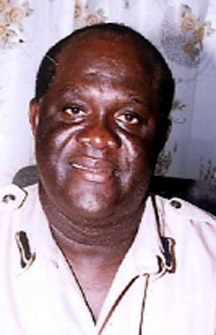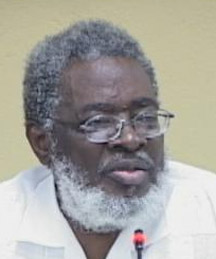The government has begun deliberations under Article 225 of the Constitution in relation to the ethical issue of Commissioner of Police Henry Greene’s admission that he had sexual relations with a witness in a matter under investigation, Cabinet Secretary Dr Roger Luncheon said yesterday.
“If no appeal is filed then I presume that the Chief Justice’s decision would hold, would stand, and it would allow us… to conclude the deliberations on the ethical issue. I would want to advise that I certainly don’t believe that that would take five weeks to conclude,” Dr Luncheon said yesterday when asked about the fate of Greene at his weekly press conference.
Following Chief Justice (ag) Ian Chang’s dismissal of the Director of Public Prosecutions’ (DPP) recommendation to charge Greene with rape, there has been mounting pressure for the commissioner to go or be removed from office. Former human services minister Priya Manickchand on Tuesday became the first senior government official to join the calls for Greene to go because of his improper behaviour in a case that has put him on the brink of a rape charge.

Manickchand, who is an attorney-at-law and currently holds the portfolio of Education Minister, also expressed disquiet at Justice Chang’s ruling, which quashes the rape advice given by the Director of Public Prosecutions and bars the police from using that advice to lay a charge.
Last month at a press briefing, Luncheon had said that the government was concerned about Greene’s admission that he had consensual sex with his accuser. He had said Greene’s conduct was an issue that would have been discussed at cabinet and could attract disciplinary action.
Luncheon, who did not address the matter in his opening statements but had to be asked about it, said the government cannot remove Greene on the say-so of newspapers, women’s lawyers or the opposition, but rather in accordance with the constitution.

“In dispensing with the services of a commissioner it is not merely pulling the plug…,” Luncheon told members of the media at Office of the President adding that there must be “substantial cause”.
“…You are not going to go on the telephone and be taped making unacceptable statements; the constitution prescribed the process for the removal of a commissioner. So even if I were intrigued by the notion of pulling the plug I will have to come back to ground floor, come back to reality and understand that there is a process, a constitutional process to so do,” he said.
Luncheon’s reference to the telephone tape was in relation to taped conversations that surfaced of former commissioner Winston Felix and others including attorney-at-law Basil Williams, which ultimately saw the former commissioner going off on retirement leave after mounting a challenge of a directive by Prime Minister Sam Hinds in the High Court. The tapes were widely believed to have been made by convicted drug trafficker Roger Khan and while Felix has not denied that the voice on the tape was his, he has maintained that the tapes were doctored.
Asked about whether the government supports the calls for Greene to go, Luncheon said while “it is a matter that is under discussion currently”, he believes that the calls are not being made to the government but rather to Greene.
Asked whether the government couldn’t just fire Greene, since he has passed the retirement age of 55 and is now on contract, Luncheon said while that might be correct Greene is still holding the post of Commissioner and is discharging the duties of commissioner properly.
“After age 55, the constitution deposes in the commissioner and the president an engagement for his services to be retained at least until age 60. I am not certain but I feel comfortable that he is yet to achieve that age 60,” the Cabinet Secretary said.
Further probed about the commissioner’s admission that he had sexual intercourse with a woman who had sought help from his office and whether or not it is an abuse of his public office, Luncheon said: “Plainly speaking, the way you put it, I would say no. What you really mean is that in the pursuit of his functions that indeed a witness in a matter under investigation engaged with the commissioner, in his words, in sexual encounters and if you say that then this is an ethical problem.”
And as to whether the government will address the ethical problem, Luncheon said that in addition to the ethical dimensions from the beginning much focus were on the criminal aspect because the female in the matter cried rape.
“The DPP advised charge, the Chief Justice on a constitutional motion rejected the advice of the DPP to charge,” Luncheon said.
He added that until the government is certain that the authorities that are vested with the responsibility of appeal will not move in that direction only then will it take action of its own.
“But if we were to assume that the criminal matter has been dealt with…then you could understand now cabinet’s… address of the other aspects of this matter.”
In answer to the question as to whether pending criminal proceedings barred the government from taking actions against Greene, Luncheon said the question is a moot one since as of yesterday the government had taken no action.
Caution is the word of the game for the government, as Dr Luncheon said that it has to be clear in their minds that “when we do make decisions that they would at least be decisions …that are beyond the kind of contention…” These contentions, he said, have evolved since the Chief Justice’s decision and as such the government would “like to be on the correct and safe side and indeed adopt a position that resonates, that addresses the concerns of all and sundry in this matter.”




